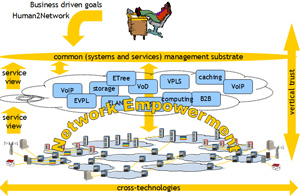About UniverSelf
UniverSelf, realizing autonomics for Future Networks
Project Details
FP7 Project Contract Number: 257513
Start Date: 01-09-2010
Duration: 36 months
End Date: 31-08-2013
Project Total Cost: 16.6 million euro
EC Contribution/Funding: 10.5 million euro
Project Coordinator: Laurent Ciavaglia, Alcatel - Lucent Bell Labs France
Technical Manager: Christian Destré, France Telecom SA
Main Objectives
UniverSelf unites 17 partners with the aim of overcoming the growing management complexity of future networking systems, and to reduce the barriers that complexity and ossification pose to further growth.
While there has been undeniable progress in the field of autonomics research over the past several years across the world and especially in Europe, widespread deployments of self-management techniques are still missing. At the same time the need for techniques enabling the transformation of operational models, the evolution of networks towards a flexible playground for operators, and more generally techniques participating to the increase of the return on investment, is becoming more and more evident. Further, most efforts and initiatives have been focussed on solving manageability bottlenecks in a given technological domain, while services extend anywhere, regardless of the technological boundaries (e.g., wireline/wireless).
UniverSelf arises from this context and is thus driven by the need and objective to take self-management a leap further, and, in doing so, be both a federating and impactful project.
This translates into four major goals :
-
 The design of a Unified Management Framework for the different existing and emerging architectures, or for architectures designed in past autonomic research. This unified and evolvable framework will constitute a cross-technology (wireless and wireline), common substrate for both systems and services.
The design of a Unified Management Framework for the different existing and emerging architectures, or for architectures designed in past autonomic research. This unified and evolvable framework will constitute a cross-technology (wireless and wireline), common substrate for both systems and services. - The design of all required functions to achieve self-management and embed these features right into the systems and network equipments that constitute the infrastructure and support service delivery, paving the way to full network empowerment.
- The impact on the industry and the push of European research into the direction of exploitation. This will be done by demonstrating the possibility to deploy autonomic solutions in carrier grade networks.
- Finally, UniverSelf will bring confidence and trust into autonomic technologies for telecommunication networks. This will be achieved by setting a durable trend, across Europe, on the definition of labelling or “certification” techniques for autonomics empowered products.
Technical Approach
UniverSelf combines both top-down and bottom-up methodologies that shall enable to:
- Build on the relevant existing know-how and technologies that have proven their value. Consolidate existing initiatives and approaches. Identify the main features of a unified framework that could host these. Identify the architectural and functional constraints. We refer to this as a “cleaned state” approach (compared to the “clean slate” term).
- Identify the nature of problems appearing in different use-cases (distributed observation, optimization, control…), provide adequate formal models and algorithms, and integrate architectural and functional concerns.
- Bring the results of the research and development to the products by natural phased proof of concepts, validation and benchmarking as well as bring the technologies and solutions to the market by standardisation.
UniverSelf is organized into 4 technical work-packages :
WP2 (Unified Management Framework) aims at federating self-management approaches and architectures to release a global autonomic management system for both current and future networks and services, spanning wireline and wireless technologies.
WP3 (Network Empowerment) is dedicated to the study, design and evaluation of common classes of algorithms with self-x and cognitive capabilities together with the requirements for their embodiment into network functions.
WP4 (Deployment and Impact) has the mission of: (1) producing use-case refinements (pointing out real manageability bottlenecks and the related requirements); (2) making simulations and emulations of the solutions designed by the joint work of WP2 and WP3; (3) eventually deploying them into test-beds for experimental validation; (4) analyzing the impact of above solutions; (5) making the assessments for establishing trust in autonomics.
WP5 (Trend Setting) has the mission to disseminate the research outcomes and give international visibility to the project and its corresponding findings, as well as to actively support the trust and certification/labelling initiative.
An essential structuring element of UniverSelf consists in the so called use-cases, the study of which (from identification to prototyping/validation) takes the form of a life-cycle throughout the work-packages (WP4>WP3>WP2>WP4) which in turns strongly participates to the realization of an Integrated Project and maximizes the efficiency of these work-packages.
More details about the Work Packages can be found on the "About UniverSelf/Work Packages" page of this website: http://www.univerself-project.eu/work-packages.
Key Issues
 Key issues will of course arise from the use-cases and the complexity they impose to problem solving
Key issues will of course arise from the use-cases and the complexity they impose to problem solving
approaches. Unification and so, for example, finding the correct level of abstraction and generalization across heterogeneous components, identifying com
monalities in the nature of different problems,
finding common classes of algorithms for seemingly different problems are key challenges that will need to be tackled in view of the design of the UMF and the embodiment of intelligence. Standardization and more precisely, in a context where proprietary intelligence is a differentiator, the identification of the suitable elements for standardization (architecture, protocols, data formats …) is an important challenge also.
Expected Impact
UniverSelf plans to achieve highest impact with reference to the work-programme 2009-2010:
- By providing operators flexible infrastructures for increased network demand, new business opportunities as well as efficient services integration, reinforcing European leadership.
- Through self-x capabilities, enabling dynamic optimized network resource usage and allocation, resulting in reduced CapEx/OpEx and human intervention.
- Through pre-standard specifications, combined with a strong large scale experimental validation phase
- Through a novel unified framework easing the development and integration of end-to-end global interconnectivity, cooperation and real-time experience future internet services.

 Login
Login
